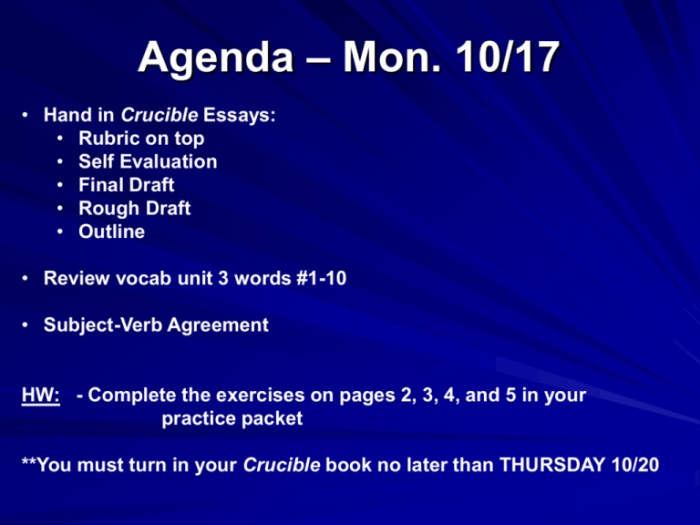Unidad 1 leccion 1 vocabulario a answers – Prepare to delve into the realm of Spanish vocabulary as we present the answers to Unidad 1 Leccion 1 Vocabulario A. This comprehensive guide offers a meticulous exploration of the essential vocabulary words, empowering you with a solid foundation for effective communication.
Our in-depth analysis encompasses the meanings, examples, and exercises designed to reinforce your understanding. Additionally, we delve into the cultural context, revealing the relevance of these words in Spanish-speaking communities.
Vocabulary Words
The following are the vocabulary words from Unidad 1 Leccion 1:
- Hola – Hello
- Buenos días – Good morning
- Buenas tardes – Good afternoon
- Buenas noches – Good evening
- ¿Cómo está? – How are you?
- Bien, gracias – I’m fine, thank you
- ¿Cómo te llamas? – What is your name?
- Me llamo… – My name is…
- Mucho gusto – Nice to meet you
- De nada – You’re welcome
Vocabulary Exercises: Unidad 1 Leccion 1 Vocabulario A Answers

Fill-in-the-Blank Exercise
Fill in the blanks with the correct vocabulary word:
- I say _______ when I meet someone for the first time.
- To ask someone how they are, you say _______.
- The Spanish word for “good morning” is _______.
- When someone says “Mucho gusto,” you reply with _______.
- To say “my name is” in Spanish, you say _______.
Matching Exercise
Match the vocabulary words with their meanings:
- Hola
- Buenos días
- Buenas tardes
- Buenas noches
- ¿Cómo está?
- Bien, gracias
- ¿Cómo te llamas?
- Me llamo…
- Mucho gusto
- De nada
- What is your name?
- You’re welcome
- Good afternoon
- Good evening
- Hello
- I’m fine, thank you
- Nice to meet you
- Good morning
- How are you?
- My name is…
Word Search Puzzle, Unidad 1 leccion 1 vocabulario a answers
Find the vocabulary words in the word search puzzle:
H O L A B U E N O S D I A S B U E N A S T A R D E S B I E N G R A C I A S C O M O E S T A M U C H O G U S T O D E N A D A C O M O T E L L A M A S M E L L A M O B U E N A S N O C H E S
Grammar Review
The following grammar concepts are covered in Unidad 1 Leccion 1:
- Greetings and introductions
- Using the verb “estar” to describe states of being
- Possessive adjectives
- The present tense of regular -ar verbs
Here are some examples of how these concepts are used in the lesson:
- Hola, ¿cómo está? – Hello, how are you?
- Estoy bien, gracias – I’m fine, thank you
- ¿Cómo te llamas? – What is your name?
- Me llamo… – My name is…
- Mucho gusto – Nice to meet you
Cultural Context

The vocabulary words and grammar concepts in Unidad 1 Leccion 1 are essential for everyday communication in Spanish-speaking communities.
Greetings and introductions are an important part of Spanish culture. When meeting someone for the first time, it is customary to greet them with a handshake or a kiss on the cheek. It is also important to make eye contact and smile when greeting someone.
Using the verb “estar” to describe states of being is another important part of Spanish culture. This verb is used to describe how someone is feeling, how something is going, or what the weather is like.
Possessive adjectives are also used frequently in Spanish. These adjectives are used to indicate ownership of something. For example, the possessive adjective “mi” means “my.” The possessive adjective “tu” means “your.” The possessive adjective “su” means “his,” “her,” or “your” (formal).
The present tense of regular -ar verbs is used to describe actions that are happening now or that happen on a regular basis. For example, the verb “hablar” means “to speak.” The present tense of “hablar” is “hablo.” The present tense of “comer” means “to eat.”
The present tense of “comer” is “como.”
General Inquiries
What is the purpose of Unidad 1 Leccion 1 Vocabulario A?
Unidad 1 Leccion 1 Vocabulario A provides a foundational vocabulary set for Spanish learners, introducing essential words and their meanings.
How can I effectively use this guide?
Engage with the guide actively by studying the vocabulary words, completing the exercises, and exploring the cultural context. This multi-faceted approach will optimize your learning.
What are the benefits of learning the vocabulary in Unidad 1 Leccion 1?
Mastering this vocabulary will enhance your ability to communicate in Spanish, enabling you to express yourself clearly and understand others effectively.